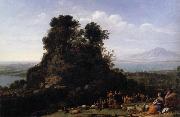Wholesale Oil Painting No Minimum |
|||||||||||
|
|
|||||||||||

|
|||||||||||
|
|
|
||||||||
Claude LorrainFrench 1600-1682 Claude Lorrain Galleries In Rome, not until the mid-17th century were landscapes deemed fit for serious painting. Northern Europeans, such as the Germans Elsheimer and Brill, had made such views pre-eminent in some of their paintings (as well as Da Vinci in his private drawings or Baldassarre Peruzzi in his decorative frescoes of vedute); but not until Annibale Carracci and his pupil Domenichino do we see landscape become the focus of a canvas by a major Italian artist. Even with the latter two, as with Lorrain, the stated themes of the paintings were mythic or religious. Landscape as a subject was distinctly unclassical and secular. The former quality was not consonant with Renaissance art, which boasted its rivalry with the work of the ancients. The second quality had less public patronage in Counter-Reformation Rome, which prized subjects worthy of "high painting," typically religious or mythic scenes. Pure landscape, like pure still-life or genre painting, reflected an aesthetic viewpoint regarded as lacking in moral seriousness. Rome, the theological and philosophical center of 17th century Italian art, was not quite ready for such a break with tradition. In this matter of the importance of landscape, Lorrain was prescient. Living in a pre-Romantic era, he did not depict those uninhabited panoramas that were to be esteemed in later centuries, such as with Salvatore Rosa. He painted a pastoral world of fields and valleys not distant from castles and towns. If the ocean horizon is represented, it is from the setting of a busy port. Perhaps to feed the public need for paintings with noble themes, his pictures include demigods, heroes and saints, even though his abundant drawings and sketchbooks prove that he was more interested in scenography. Lorrain was described as kind to his pupils and hard-working; keenly observant, but an unlettered man until his death. The painter Joachim von Sandrart is an authority for Claude's life (Academia Artis Pictoriae, 1683); Baldinucci, who obtained information from some of Claude's immediate survivors, relates various incidents to a different effect (Notizie dei professoni del disegno). John Constable described Claude Lorrain as "the most perfect landscape painter the world ever saw", and declared that in Claude??s landscape "all is lovely ?C all amiable ?C all is amenity and repose; the calm sunshine of the heart" |
||||||||
|
|
||||||||
The Sermon on the mount
The Sermon on the mount Painting ID:: 31781 |
mk76
Painted in 1656
Oil on canvas
67 1/2x102 1/4in
mk76 Painted in 1656 Oil on canvas 67 1/2x102 1/4in |
|||||||
|
|
||||||||
|
Carl Heinrich Bloch (May 23, 1834 C February 22, 1890) was a Danish painter. He was born in Copenhagen and studied with Wilhelm Marstrand at the Royal Danish Academy of Art (Det Kongelige Danske Kunstakademi) there. His early work featured rural scenes from everyday life. From 1859 to 1866, Bloch lived in Italy, and this period was important for the development of his historical style. His first great success was the exhibition of his "Prometheus Unbound" in Copenhagen in 1865. After the death of Marstrand, he finished the decoration of the ceremonial hall at the University of Copenhagen. He was then commissioned to produce 23 paintings for the Chapel at Frederiksborg Palace. These were all scenes from the life of Christ which have become very popular as illustrations. The originals, painted between 1865 and 1879, are still at Frederiksborg Palace. The Sermon On the Mount oil on canvas cyf |
||||||||
|
|
||||||||
|
Prev Next
|
||||||||
|
|
||||||||
|
Related Paintings to Carl Heinrich Bloch :. |
||||||||
|
|
||||||||
|
CONTACT US |

